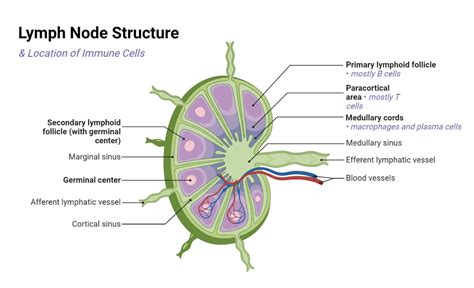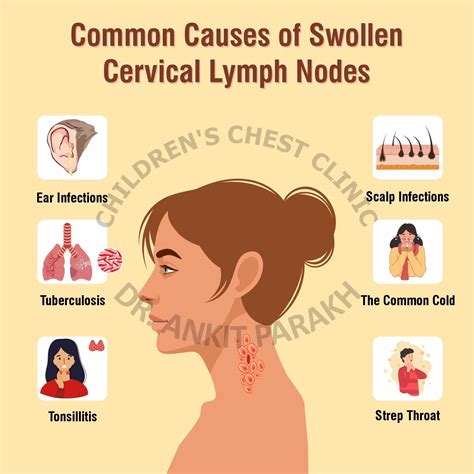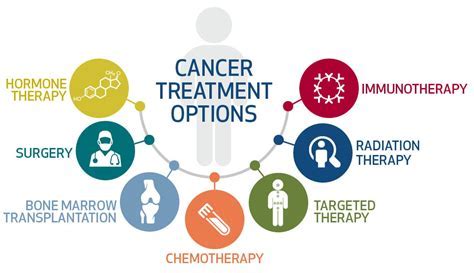Intro
Discover 5 ways to treat swollen lymph nodes, including natural remedies, home care, and medical treatments, to reduce inflammation and promote healing, alleviating lymph node pain and swelling, and restoring immune system function.
The lymphatic system plays a crucial role in our body's defense mechanism, helping to fight off infections and diseases. Lymph nodes, which are an integral part of this system, can sometimes become swollen, indicating that our body is responding to an infection or inflammation. Swollen lymph nodes can be uncomfortable and may cause concern, but there are several ways to treat them. In this article, we will explore the importance of lymph nodes, the causes of swollen lymph nodes, and most importantly, the ways to treat them.
Lymph nodes are small, bean-shaped structures that are located throughout the body, with clusters found in the neck, armpits, and groin. They contain immune cells called lymphocytes that help to fight off infections and diseases. When lymph nodes become swollen, it can be a sign that our body is responding to an infection or inflammation. This swelling can be caused by a variety of factors, including viral or bacterial infections, autoimmune disorders, or even cancer. Understanding the causes of swollen lymph nodes is essential in determining the best course of treatment.
The treatment of swollen lymph nodes depends on the underlying cause. In some cases, swollen lymph nodes may resolve on their own without the need for treatment. However, if the swelling is caused by an underlying infection or condition, treatment may be necessary. There are several ways to treat swollen lymph nodes, ranging from home remedies to medical treatments. In the following sections, we will explore these treatment options in more detail, providing you with a comprehensive guide on how to treat swollen lymph nodes.
Understanding Lymph Nodes

Causes of Swollen Lymph Nodes

Common Causes of Swollen Lymph Nodes
Some common causes of swollen lymph nodes include: * Viral or bacterial infections * Autoimmune disorders * Cancer * Injury or trauma * Infections such as tuberculosis or cat scratch diseaseTreatment Options for Swollen Lymph Nodes

Home Remedies for Swollen Lymph Nodes
Some home remedies that may help to reduce swelling and alleviate discomfort include: * Applying a warm compress to the affected area * Taking over-the-counter pain relievers such as acetaminophen or ibuprofen * Getting plenty of rest and staying hydrated * Elevating the affected area to reduce swellingMedical Treatment for Swollen Lymph Nodes

When to Seek Medical Attention
It is essential to seek medical attention if you experience any of the following symptoms: * Severe pain or swelling * Fever or chills * Difficulty swallowing or breathing * Swelling that lasts for more than two weeks * A lump or mass in the neck, armpit, or groinPreventing Swollen Lymph Nodes

Tips for Boosting Your Immune System
Some tips for boosting your immune system include: * Eating a healthy diet rich in fruits, vegetables, and whole grains * Getting regular exercise, such as walking or jogging * Getting enough sleep, aiming for 7-8 hours per night * Managing stress, such as through meditation or yogaConclusion and Next Steps

What are the common causes of swollen lymph nodes?
+Common causes of swollen lymph nodes include viral or bacterial infections, autoimmune disorders, cancer, injury or trauma, and infections such as tuberculosis or cat scratch disease.
How can I treat swollen lymph nodes at home?
+Home remedies for swollen lymph nodes include applying a warm compress to the affected area, taking over-the-counter pain relievers, getting plenty of rest, and staying hydrated.
When should I seek medical attention for swollen lymph nodes?
+You should seek medical attention if you experience severe pain or swelling, fever or chills, difficulty swallowing or breathing, swelling that lasts for more than two weeks, or a lump or mass in the neck, armpit, or groin.
Can swollen lymph nodes be prevented?
+Yes, swollen lymph nodes can be prevented by practicing good hygiene, getting vaccinated against certain diseases, eating a healthy diet, and getting regular exercise to boost your immune system.
What are the complications of untreated swollen lymph nodes?
+Untreated swollen lymph nodes can lead to complications such as infection, abscess, or cancer. It is essential to seek medical attention if you experience any symptoms of swollen lymph nodes.
We hope this article has provided you with a comprehensive guide on how to treat swollen lymph nodes. If you have any further questions or concerns, please do not hesitate to comment below. Share this article with your friends and family to help them understand the importance of lymph nodes and how to treat swollen lymph nodes. Remember, seeking medical attention is essential if you experience any symptoms of swollen lymph nodes. By taking the necessary steps, you can help to prevent swollen lymph nodes and maintain a healthy immune system.
